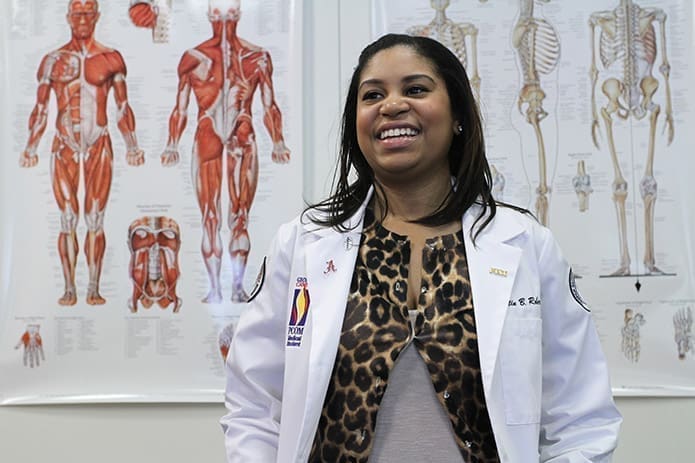 Photo By Michael Alexander
Photo By Michael AlexanderSuwanee
Medical Student Hopes To Bring Faith To Patients
By STEPHEN O'KANE, Staff Writer | Published February 28, 2013
SUWANEE—Second-year medical student Brittni Robertson realizes that addressing a person’s health requires looking at more than just the physical. As a Catholic, she is working hard to prepare both intellectually and spiritually for her future role as a practicing osteopathic physician.
Robertson, 26, attends the Georgia campus of the Philadelphia College of Osteopathic Medicine, Suwanee.
Her interest in science goes back several years to when she was a child growing up in Birmingham, Ala. She always favored science classes and continued the trend through college when she majored in biology at the University of Alabama in Tuscaloosa.
Robertson always had a heart for helping and listening to people, so it seemed like a natural progression to pursue a career in medicine.
“I guess I’ve always been a natural helper to other people so I think that, combined with my interest in science, is what sparked” her pursuit of medicine, she said. “It’s really the only job I’ve ever wanted to have.”
As a member of the Catholic Medical Association and the Christian Medical and Dental Association, Robertson is happy to have found a group of people who share her interest in bringing faith and science together.
“It’s a really good thing that you can get together with people that have similar beliefs as you and have a built-in support system,” said Robertson. “That support is really important, especially in medical school, because it is already such a stressful environment.”
This past summer, Robertson had the opportunity to shadow a family medicine doctor in her hometown of Birmingham and was refreshed to see a physician incorporate faith into her practice.
“It was really interesting to see her interact with patients and use her faith,” Robertson said. “I really got to see an example of how you can incorporate your faith.”
It wasn’t in an overbearing way, she said. The doctor didn’t address the faith aspect with every patient, but when the doctor noticed someone who was really struggling she was not afraid to tend to the spiritual side of the person.
“It added a nice, personal touch to the patient interactions,” said Robertson. “The patients really appreciated it. … It was a good way for me to see someone actually putting (their faith) into play.”
“OK, I really can do this,” she told herself after working with the doctor.
Robertson recognized that by opening the door to connect with patients’ faith, a stronger and closer connection could be made. It shows the doctor really cares about the patient, she said.
It also goes along with the osteopathic philosophy, she added. Osteopathic medicine is a form of medical practice that uses hands-on diagnosis and treatment through a system of therapy known as osteopathic manipulative medicine, in addition to all the benefits of modern medicine like surgery and prescription drugs. The osteopathic approach focuses on healing the entire person—body, mind and soul.
Osteopathic medicine was founded in the late 1800s in Kirksville, Mo., by A.T. Still, a medical doctor who recognized that the medical practices of the day often caused more harm than good. He focused on developing a system of medical care that would promote the body’s innate ability to heal itself and called this system of medicine “osteopathy,” now known as osteopathic medicine. Osteopathic physicians earn a D.O. designation (Doctor of Osteopathic Medicine) instead of the M.D. (Doctor of Medicine), with which most people are familiar.
The practice of osteopathic medicine is growing, with one in every five medical students attending an osteopathic school, according to the American Association of Colleges of Osteopathic Medicine. Robertson relocated to Georgia to attend the school, first spending a year earning a biomedical certificate before formally entering the osteopathic program.
As she looks toward the future, she is excited to answer the call to serve patients both physically and spiritually.
“It’s a grueling process and not for the faint of heart,” she said, smiling, about medical school. “You want to make sure you are coming into it for the right reasons. Don’t think of it like you are becoming a doctor who happens to be Christian, but that you are a Christian who happens to be a doctor.”
“I feel like this is something that God placed on my heart,” Robertson said. “Being a doctor provides a really good platform to minister to other people.”